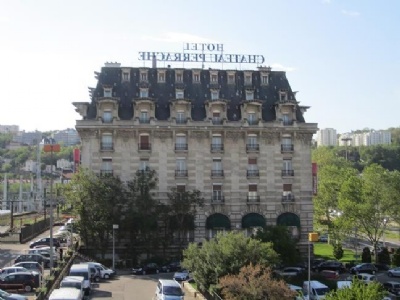Lyon – Hotel Terminus
Between November 1942 and June 1943, the Lyon Gestapo had its headquarter’s in hotel Terminus (now the Grand hotel Chateau Perrache). Head of the Lyon Gestapo was Hauptsturmführer Klaus Barbie.
Current status: Preserved (2012).
Address: Cours de Verdun Rambaud, 69002 Lyon.
Get there: Metro to Ampére Victor Hugo Station.
Follow up in books: Linklater, Magnus: The Nazi Legacy: Klaus Barbie and the International Fascist Connection (1985).

Klaus Barbie has become better known as the Butcher from Lyon and was one of the most sought after Nazis. Barbie participated actively in both interrogation and torture of prisoners. He led the round-up of the children and their supervisors from the Jewish orphanage in Izieu, later deported to Auschwitz in the spring of 1944. He is also responsible for the torture and murder of the French resistance fighter Jean Moulin in July 1943. Barbie was suspected for his time as Gestapo chief in Lyon being responsible for the deaths of about 14,000 people. After the war, Barbie was recruited by the american intelligence service and served as an informant in the american occupation zone in the former West germany. However, France’s increasingly demanding extradition demands eventually became a burden for the Americans.
But the Americans didn’t want to hand over Barbie, instead they helped him and his family to escape to Bolivia in 1951. There Barbie took the false name, Klaus Altmann. He first made his living as an entrepreneur in various fields, not necessary legally. He became a Bolivian citizen in 1957, socializing with dubious fascists and neo-Nazis. In the mid-sixties he was recruited partly by the Bolivian security services and partly by the western german intelligence service. His main task was to provide information about leftists. He had good contacts and some influence within the Bolivian government under whose wings he was protected. In parallel with his intelligence work, he did some illegal business and thus made enemies.
Barbie’s crimes during the war had been known for a long time. In the early fifties he was sentenced to death twice by a French court for crimes committed in France. It was also known since 1971 that he lived under false identity in Bolivia. However, the Bolivian authorities did not comply with the French authorities’ request to have Barbie extradited, they had their reasons for keeping him, but this changed when Bolivia got a new government in 1983. The new government found no reason why Barbie could not be extradited to France. Barbie had, after all, been living in the country under a false name and was also suspected of tax fraud. Barbie was arrested and taken first to French Gyuana, where he was handed over to the French and flown to Lyon.
The Barbie trial began in May 1987, and when asked about his name, he answered Altmann and not Barbie. Barbie asked not to be present at the trial, but wanted to remain in his cell for the rest of the trial. This was granted except for one day when he had to appear in court to face some witnesses. Barbie was sentenced to life in prison for crimes against humanity. The trial was considered to be of such an important nature that it was filmed. This contributed to the collective memory of Barbie being compared to other Nazi war criminals such as Mengele and Eichmann. In September 1991 and at the age of 77, Barbie died of leukemia while serving his sentence.